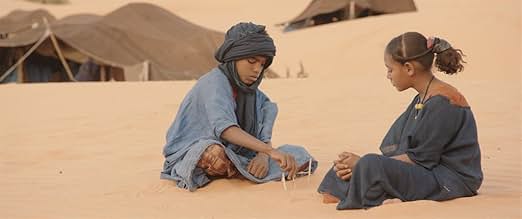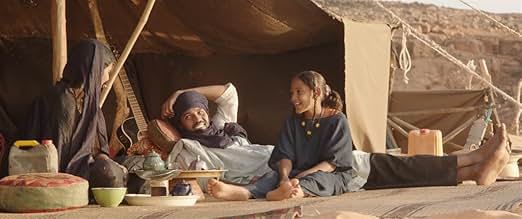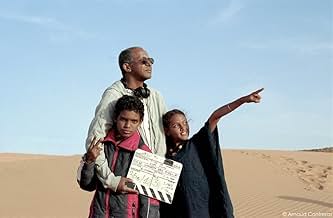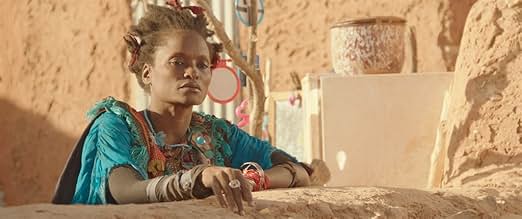VALUTAZIONE IMDb
7,1/10
18.740
LA TUA VALUTAZIONE
Un pastore vive con famiglia vicino a Timbuctù. La tranquillità vissuta tra le dune del deserto è bruscamente interrotta dall'arrivo di jihadisti che impongono la sharia.Un pastore vive con famiglia vicino a Timbuctù. La tranquillità vissuta tra le dune del deserto è bruscamente interrotta dall'arrivo di jihadisti che impongono la sharia.Un pastore vive con famiglia vicino a Timbuctù. La tranquillità vissuta tra le dune del deserto è bruscamente interrotta dall'arrivo di jihadisti che impongono la sharia.
- Regia
- Sceneggiatura
- Star
- Candidato a 1 Oscar
- 33 vittorie e 28 candidature totali
Ibrahim Ahmed
- Kidane
- (as Ibrahim Ahmed dit Pino)
Yoro Diakité
- Djihadiste
- (as Yoro Diakite)
Weli Kleïb
- Juge
- (as Weli Cleib)
Recensioni in evidenza
One of the movies that's still in the running for a "Best Foreign Language Film" Oscar nomination, is Timbuktu. Together with the Estonian Mandariinid it's one of my favorites for this year's Academy Awards, but I'm afraid only one of them will make it to the shortlist and neither of them will eventually win the Oscar. Not while movies like Ida, Turist and Leviathan are their competitors (although I think Timbuktu and Mandariinid are better than those three). The thing about Timbuktu that makes it such a beautiful picture, is its, what I presume, authentic representation of Muslims and the different views on Islamic religion. Spoken in a number of languages, from French and English to Arabic and a wide diversity of African languages (Tamasheq, Bambara and Songhay), Timbuktu shows Westerners a part of the world we almost know nothing about. Apart from judgemental and arrogant claims about the (religious) backwardness of many people there, be they Berber or Bedouin, many people here just don't know what to say about the Northern part of Africa. Director Abderrahmane Sissako gives us lots of stuff to talk and think about (for example the use of "jihad" as on the one hand an inner struggle (the greater jihad) and on the other hand an external holy war which is fought by mujahideen - the second jihad being the one we fear and loathe so much in the West). Not only that, but together with his cinematographer Sofian El Fani (La Vie d'Adèle) he manages to provide us with wonderful visual poetry and exceptional sceneries of south-east Mauritania. While it took some getting used to the narrative and the editing, I was full of awe after enjoying this utterly majestic work of art. Highly recommended!
At the end of Woody Allen's Bananas, the leader of the successful Latin American revolution starts making crazed pronouncements: "The official language of the country will be Swedish! Everyone must change their underwear every day, and wear it on the outside so we can check!" That's kind of what happens when the jihadists come to town in Timbuktu, only its tragic, not funny. A bunch of mostly foreigners with AK-47s show up in a Muslim community, tell all the locals they're not Muslim enough, and oh, by the way, use the Qaran to justify taking anything they feel like taking, including marriageable young women. You come away with a sense of what it feels like for ordinary people to live through this, and it's not pretty at all.
For someone raised in Mauritania as I was, it was quite something to watch the first Mauritanian movie nominated for a Foreign Film Oscar. I saw it in, of all places, in a movie theatre in Rio de Janeiro, the first week of its release in Brazil.
The language of cinema is truly universal as you see people who belong to an entirely different culture react in a similar way to someone from that culture. Of course there are some references not easy to get, such as the one to music lauding the Prophet by Mauritanian female artist Dimi mint Abba which is heard in a key scene showing how absurd these Islamists' prohibitions are.
Unsure, also, whether people can tell when different actors use different languages (Arabic, Tuareg, Bambara etc.).
The soccer game scene is one of the best I saw this year on the big screen, and the one with the killing of astounding beauty.
Definitely a great director at work here, despite obvious limited resources.
The language of cinema is truly universal as you see people who belong to an entirely different culture react in a similar way to someone from that culture. Of course there are some references not easy to get, such as the one to music lauding the Prophet by Mauritanian female artist Dimi mint Abba which is heard in a key scene showing how absurd these Islamists' prohibitions are.
Unsure, also, whether people can tell when different actors use different languages (Arabic, Tuareg, Bambara etc.).
The soccer game scene is one of the best I saw this year on the big screen, and the one with the killing of astounding beauty.
Definitely a great director at work here, despite obvious limited resources.
"Timbuktu" (2014 release from Mauritania; 99 min.) brings the story (fictional, by influenced by real events) of how the Mali town copes with the 'liberation' by jihadis. As the movie opens, we see the jihadis having a shooting practice by destroying the local wood statutes. The jihadis issue all kinds of rules ("smoking is forbidden! music is forbidden!"), much to the irritation of the local Mali population. We get to know one local family in particular, a husband and wife with their 12 yr. old daughter. They live a bit outside of the city center where the desert takes over, going about their daily business as best as possible. Then one day, one of the husband's cow accidentally destroys the fishing nets of the fisherman, who promptly kills the cow. The husband decides that he cannot tolerate this. To tell you more would spoil your viewing experience, you'll just have to see for yourself how it all plays out.
Couple of comments: first, it is a small miracle that a movie like "Timbuktu" could even have been made. Writer-director Abderrahmane Sissako shot the movie in Mauritania, which subs for Mali, but let's not kid ourselves. Mauritania is an "Islamic Republic", so it was no easy feat to shoot there either. Second, Sissako demonstrates again and again how much the local population resends the jihadis for uprooting their lives. There are several scenes in which a local man pleads with the jihadis ("where is forgiveness? where is leniency?"), to no avail of course. Playing soccer will cost you 20 leashes. Playing music comes at 40 lashes. Being in the room with someone from the opposite sex is another 40 lashes, and on and on. The fact that the neither side can understand the other (they speak Tamasheq in Timbuktu, the jihadis mostly speak Arabian, some also speak French or English) only makes the entire situation even more absurd. Second, while there are some shocking scenes in the movie, overall this is not a violent or graphic film. Almost on the contrary, in that the movie's editing and photography is done in such a way that it induces a false sense of peace and security. The photography in particular is pure eye-candy. Third, I have no idea where Sissako found these performers, but there are some wonderful performances, in particular from the wife and the 12 yr. old daughter. Bottom line: there is a good reason why this film is nominated for the Best Foreign Language Oscar, as it is a deeply moving film that will stay with you long after you have seen it.
The movie finally opened this weekend at my local art-house theater here in Cincinnati, and I went to see it right away. The matinée screening where I saw this at today was attended okay but not great, although I'm hoping that the bitter cold weather is a factor for that. If you like a top-notch foreign film that provides a glimpse of what real life under jihad is like, you cannot go wrong with this. "Timbuktu" is HIGHLY RECOMMENDED!
Couple of comments: first, it is a small miracle that a movie like "Timbuktu" could even have been made. Writer-director Abderrahmane Sissako shot the movie in Mauritania, which subs for Mali, but let's not kid ourselves. Mauritania is an "Islamic Republic", so it was no easy feat to shoot there either. Second, Sissako demonstrates again and again how much the local population resends the jihadis for uprooting their lives. There are several scenes in which a local man pleads with the jihadis ("where is forgiveness? where is leniency?"), to no avail of course. Playing soccer will cost you 20 leashes. Playing music comes at 40 lashes. Being in the room with someone from the opposite sex is another 40 lashes, and on and on. The fact that the neither side can understand the other (they speak Tamasheq in Timbuktu, the jihadis mostly speak Arabian, some also speak French or English) only makes the entire situation even more absurd. Second, while there are some shocking scenes in the movie, overall this is not a violent or graphic film. Almost on the contrary, in that the movie's editing and photography is done in such a way that it induces a false sense of peace and security. The photography in particular is pure eye-candy. Third, I have no idea where Sissako found these performers, but there are some wonderful performances, in particular from the wife and the 12 yr. old daughter. Bottom line: there is a good reason why this film is nominated for the Best Foreign Language Oscar, as it is a deeply moving film that will stay with you long after you have seen it.
The movie finally opened this weekend at my local art-house theater here in Cincinnati, and I went to see it right away. The matinée screening where I saw this at today was attended okay but not great, although I'm hoping that the bitter cold weather is a factor for that. If you like a top-notch foreign film that provides a glimpse of what real life under jihad is like, you cannot go wrong with this. "Timbuktu" is HIGHLY RECOMMENDED!
On April 1, 2012, the National Movement for the Liberation of Azawad (MNLA) and the Al Qaeda linked Ansar Dine, took over Timbuktu in the African country of Mali, and placed it under Sharia law. Director Abderrahmane Sissako was born in his mother's country of Mauritania, but spent most of his life in Mali, his father's place of birth. Sissako's main goal in "Timbuktu," is to expose both the harsh rule of the Jihadists along with their hypocrisy.
Sissako begins his story with images of Africa animist statutes being machine-gunned (off screen) by the newly minted oppressors of Timbuktu. Sissako's Jihadists are not simply one-dimensional villains. The leader of the lot, Abdelkrim, hails from Libya and must utilize an interpreter to communicate his harsh vision of Islam. Despite his puritanical orders, Abdelkrim is not averse to talking shop about soccer (which is banned in the city) as well as smoking cigarettes.
Abdelkrim soon realizes that his local conscripts aren't as enthusiastic about Jihad than he is. He attempts to coach one of his local soldiers to fashion a propaganda message before a video camera but the young man just doesn't seem to be able to say things like he means it.
While the Jihadists drive around in SUV's with machine guns slung over their shoulders, the administration of Sharia law proceeds at a snail's pace. This is probably due to the slow paced nature of life in that part of the world to begin with. I was expecting brutal large scale massacres along the lines of ISIS in Syria or Iraq, but most of the jihadists' violent actions are selective: a woman receives lashes for singing and a couple is stoned to death for committing adultery.
Sissako doesn't focus a great deal of time in fleshing out his victims, although a couple of his characters hit the mark: the odd but interesting Haitian female shaman who isn't afraid to thumb her nose at her oppressors as well as a local Iman who attempts to reason with the jihadists over one of their soldiers taking a young girl as his bride against her wishes.
Sissako's main character who constitutes the main part of the narrative is Kidane, a local herder who lives out in the countryside with his wife and daughter. As A. O. Scott argues, "He is a symbol of decency and tolerance, of everything the extremists want to destroy, precisely because he is an intriguing, fully rendered individual." I'm not sure if I agree with Mr. Scott that Kidane is "full rendered," as Mr. Sissako goes out of his way to emphasize the character's saintliness a little too often (yes we do come to realize that Kidane's daughter does mean just about everything to him).
Kidane does have an Achilles heel and Sissako perhaps suggests that Kihane's thirst for revenge may be endemic in the culture. After a local fisherman kills one of his prize cows, Kihane goes to "talk" to him, carrying a gun (his wife warns him not to carry the gun, but he ignores her). Sure enough, the argument between the two turns into a killing-whether the shot that was fired occurred during the struggle or was intentional-is unclear. Kihane ends up before the Jihadi court but probably would have ended up in the same situation, no matter who was administering justice.
Some critics have suggested that Sissako's style is akin to Brecht. Certainly a good part of his strategy is to make his audience aware of social injustice and exploitation in a part of the world most westerners are not familiar with. If some of his characters seem a bit sketchy, that's because Sissako has fashioned more of a fable than docudrama. Under the veneer of Sissako's tragic landscape, the clarion call for freedom continues to resonate.
Sissako begins his story with images of Africa animist statutes being machine-gunned (off screen) by the newly minted oppressors of Timbuktu. Sissako's Jihadists are not simply one-dimensional villains. The leader of the lot, Abdelkrim, hails from Libya and must utilize an interpreter to communicate his harsh vision of Islam. Despite his puritanical orders, Abdelkrim is not averse to talking shop about soccer (which is banned in the city) as well as smoking cigarettes.
Abdelkrim soon realizes that his local conscripts aren't as enthusiastic about Jihad than he is. He attempts to coach one of his local soldiers to fashion a propaganda message before a video camera but the young man just doesn't seem to be able to say things like he means it.
While the Jihadists drive around in SUV's with machine guns slung over their shoulders, the administration of Sharia law proceeds at a snail's pace. This is probably due to the slow paced nature of life in that part of the world to begin with. I was expecting brutal large scale massacres along the lines of ISIS in Syria or Iraq, but most of the jihadists' violent actions are selective: a woman receives lashes for singing and a couple is stoned to death for committing adultery.
Sissako doesn't focus a great deal of time in fleshing out his victims, although a couple of his characters hit the mark: the odd but interesting Haitian female shaman who isn't afraid to thumb her nose at her oppressors as well as a local Iman who attempts to reason with the jihadists over one of their soldiers taking a young girl as his bride against her wishes.
Sissako's main character who constitutes the main part of the narrative is Kidane, a local herder who lives out in the countryside with his wife and daughter. As A. O. Scott argues, "He is a symbol of decency and tolerance, of everything the extremists want to destroy, precisely because he is an intriguing, fully rendered individual." I'm not sure if I agree with Mr. Scott that Kidane is "full rendered," as Mr. Sissako goes out of his way to emphasize the character's saintliness a little too often (yes we do come to realize that Kidane's daughter does mean just about everything to him).
Kidane does have an Achilles heel and Sissako perhaps suggests that Kihane's thirst for revenge may be endemic in the culture. After a local fisherman kills one of his prize cows, Kihane goes to "talk" to him, carrying a gun (his wife warns him not to carry the gun, but he ignores her). Sure enough, the argument between the two turns into a killing-whether the shot that was fired occurred during the struggle or was intentional-is unclear. Kihane ends up before the Jihadi court but probably would have ended up in the same situation, no matter who was administering justice.
Some critics have suggested that Sissako's style is akin to Brecht. Certainly a good part of his strategy is to make his audience aware of social injustice and exploitation in a part of the world most westerners are not familiar with. If some of his characters seem a bit sketchy, that's because Sissako has fashioned more of a fable than docudrama. Under the veneer of Sissako's tragic landscape, the clarion call for freedom continues to resonate.
Lo sapevi?
- QuizIn 2015 Timbuktu became the first film shot in Mauritania by a Mauritanian director to win at the Cesar film awards. It won seven awards out of its eight nominations including Best Film, Best Director, Best Original Screenplay, Best Editing, Best Cinematography, Best Music and Best Sound, thus setting the record for being the African film with the most awards ever.
- BlooperIn the stoning scene, both man and woman are buried up to their necks. In a proper Islamic stoning (rajm), the woman should only be buried up to her waist.
- ConnessioniFeatured in The Oscars (2015)
- Colonne sonoreShooting The Statues
Composed, Arranged and Orchestrated By Amine Bouhafa
with The City of Prague Philharmonic Orchestra
© 2014 Universal Music France
I più visti
Accedi per valutare e creare un elenco di titoli salvati per ottenere consigli personalizzati
- How long is Timbuktu?Powered by Alexa
- Is this film about the Islamic State?
Dettagli
- Data di uscita
- Paesi di origine
- Siti ufficiali
- Lingue
- Celebre anche come
- Timbuktú
- Luoghi delle riprese
- Oualata, Mauritania(as Timbuktu)
- Aziende produttrici
- Vedi altri crediti dell’azienda su IMDbPro
Botteghino
- Lordo Stati Uniti e Canada
- 1.076.075 USD
- Fine settimana di apertura Stati Uniti e Canada
- 45.110 USD
- 1 feb 2015
- Lordo in tutto il mondo
- 7.179.391 USD
- Tempo di esecuzione1 ora 36 minuti
- Colore
- Proporzioni
- 2.35 : 1
Contribuisci a questa pagina
Suggerisci una modifica o aggiungi i contenuti mancanti



























